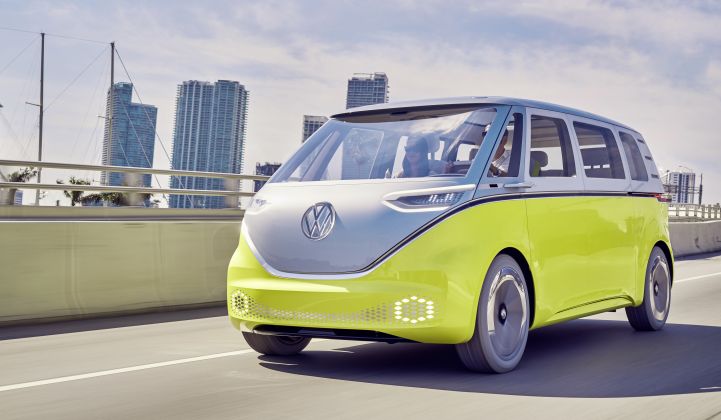German automotive giant Volkswagen will become the largest manufacturer of EVs before 2030, according to new analysis from Wood Mackenzie.
WoodMac expects Volkswagen to produce 14 million battery electric vehicles (BEVs) cumulatively by 2028, and climb from its 2018 ranking as the 10th largest manufacturer to the very top of the global pile.
VW’s own internal target is to produce 22 million BEVs by 2028. But that looks unrealistic, according to Ram Chandrasekaran, principal analyst at Wood Mackenzie.
Selling 22 million EVs would mean capturing 53 percent of the global BEV market share out to 2028, according to WoodMac's base-case scenario. "The company would also need to secure 57 percent of all EV battery pack production, something that would prove to be extremely challenging,” said Chandrasekaran.
The 14 million figure is based on VW’s own plans and production capacity, plus anticipated incremental improvements. While short of VW's own goal, it would still represent a very healthy 27 percent share of the global market.
Even at the projected 27 percent market share, VW would need access to three-tenths of the world's EV battery cell production.
VW has a number of supply contracts in place today, including a lithium supply deal with Ganfeng and cell supply deals with Samsung SDI, LG Chem, SK Innovation and CATL, Chandrasekaran noted. Most recently, VW invested $1 billion in Northvolt, a Swedish battery manufacturer.
"However, there have been issues with some of these companies, therefore threatening VW's targets,” Chandrasekaran said.
Competition from Elon Musk
In a separate piece of research, WoodMac said it expects Tesla to sell 6 million BEVs between 2018 and 2028. But Tesla could supercharge its efforts if it released an entry-level vehicle around the $25,000 mark, potentially hitting 8 million units sold during the same period.
Tesla has said it wants to control 1 percent of all global car sales, not just BEVs, but Chandrasekaran said the company would need to broaden its offering to get there, including the possible launch of an entry-level car.
Chandrasekaran noted that the car most frequently traded in for a Tesla Model 3 is a Toyota Prius, the latter of "which is incidentally priced at $24,200.” The release of an entry-level car could see Tesla reach that 1 percent goal as early as 2024.
Analyst upgrades and progress with its factory in China have seen Tesla’s share price surpass $500 for the first time, even though the company did not turn a profit in 2019.
"Tesla appears to be in a strong position," said Chandrasekaran.
“The company has secured $1.6 billion [of] financing from state-backed lenders at interest rates lower than the People's Bank of China’s market rate. It also has...contracts with LG Chem and CATL to supply battery packs for its new factory."
Pilot production at its new China factory location has begun and mass production is expected this year, doubling the production capacity of the Model 3 in the process.
Land has been acquired for a third Tesla manufacturing site, expected to be in Berlin.
The diversified base of factories will help soften any impact from the ongoing trade wars, said Chandrasekaran.




